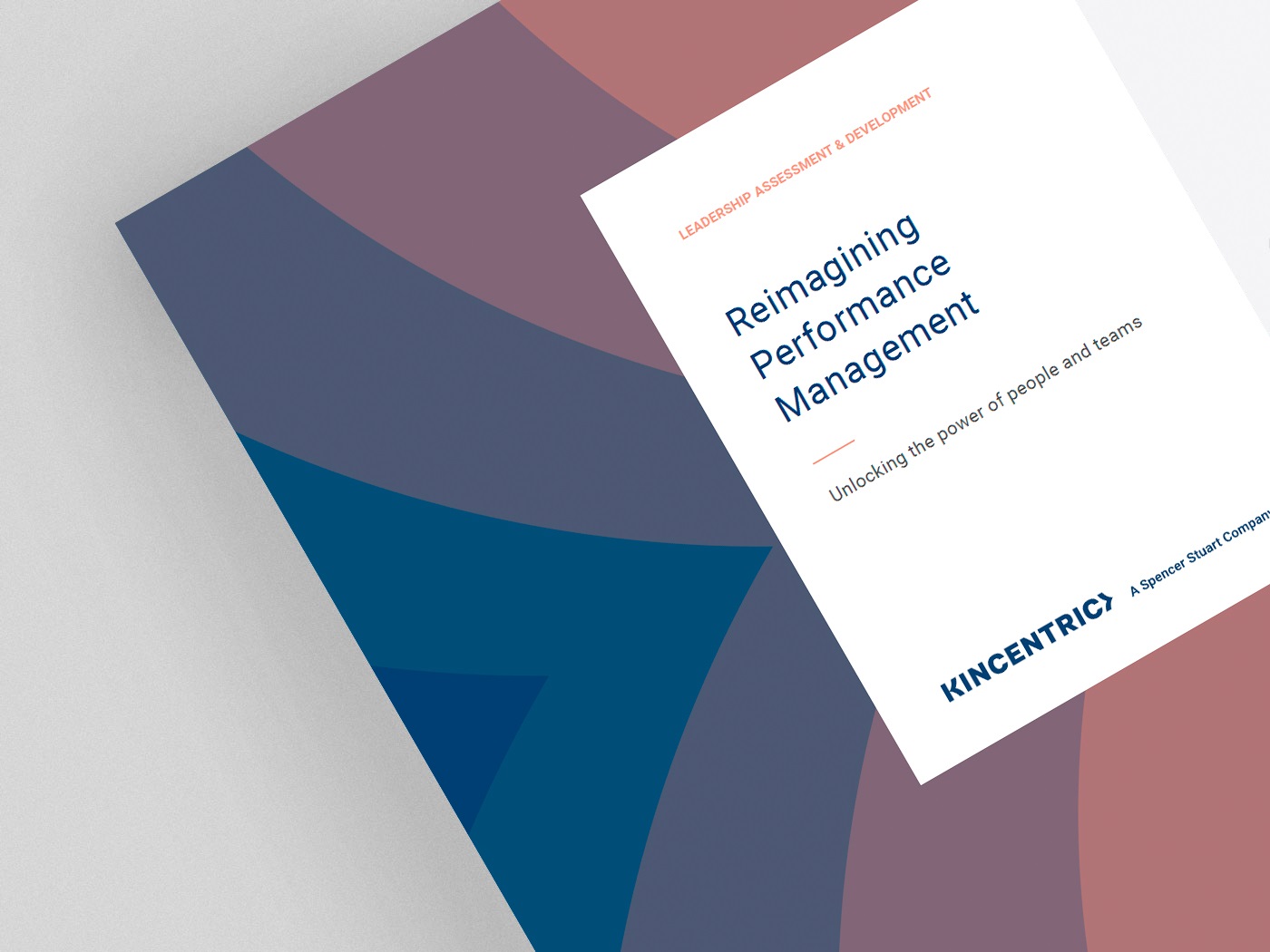
Performance management continues to be a hot topic, entering the world of mass media and getting the attention of the C-suite. Yet for all the headlines, few things in talent management have been as misunderstood or executed with less forethought. In recent years, much has been written about the knee-jerk reactions some organizations have had when struggling with performance management. Since then, the waters have only become murkier as more firms seem to be getting rid of ratings and “blowing things up.”
Not so fast.
First, we do need to face it — performance management continues to be in a sad state. Managers think of it as an administrative burden and continue to hide from uncomfortable conversations with employees. Leaders worry about the apparent disconnect between performance distribution and collaboration, and struggle to promote the process itself as valuable and motivating. And of course HR is on the receiving end of all the complaints and wonders if it’s even worth the hassle.
It shouldn’t come as a surprise, then, that some organizations have declared performance reviews and ratings as simply incomplete.
We’re often asked:
For HR practitioners in the real world, it doesn’t help that media outlets are blaring that performance management is dead, or that supposed “thought leaders” cite obscure research that flies in the face of common sense and practical application.
It’s time to pull back the curtain on what’s happening, what employees really want, and how to win the war for talent through performance management that actually works.
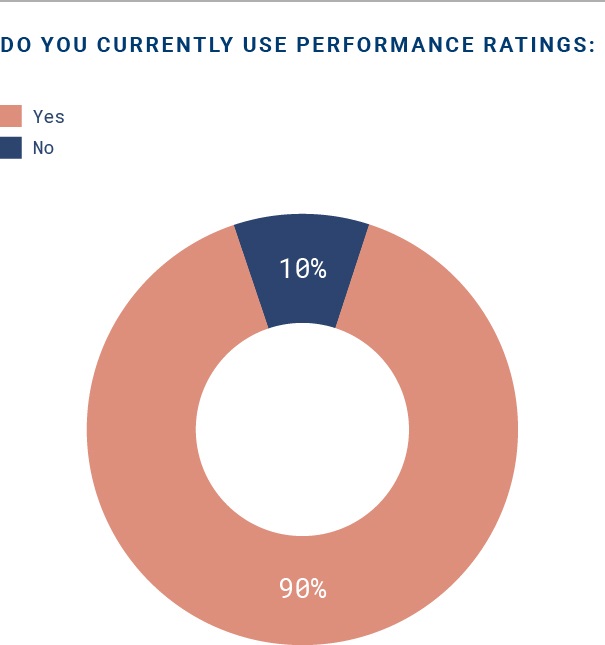
Let’s first address the specific hot-button issue of discarding performance ratings, and what many perceive as a “seismic change” in the performance management landscape. It’s simply not the case. Research has shown that only a small number of organizations have actually given up ratings, or even plan to. Studies conducted by McLagan and Radford in 2015 uncovered the percentage of companies that do not use performance ratings is just 10%. Of those that currently use ratings, only 8% are considering whether to drop the practice. Hardly a “seismic change.”
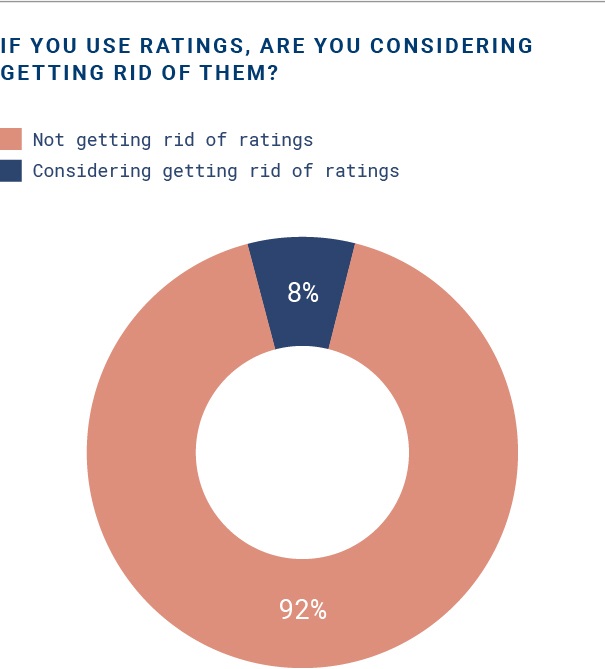

What about organizations that have actually gotten rid of ratings? First, be careful when reading headlines. They can sometimes overstate the case or even fail to capture what has actually changed. Organizations that claim to have “blown up” performance management fall into these categories:
As we noted in previous thought leadership, this is a non-starter. How many boards will publicly say they’re throwing out pay for performance? How many leaders will say they don’t want a “meritocracy”?
The only thing this “strategy” gets right is the recognition that differentiation and pay for performance go hand in hand; so its solution is to get rid of both.

Get rid of ratings, still pay for performance, and focus on the employee-manager conversation. Because most organizations won’t admit to getting rid of pay for performance (or simply can’t), this became a popular category. We can have our cake and eat it too — no ratings, yet still paying for performance.
But here’s the issue: To differentiate pay outcomes, we need to differentiate performance.
We cautioned that discarding ratings would simply move differentiation underground. And that’s what happened. One global insurance organization that went down this path recently asked us, “How do we deal with the ‘shadow ratings’ we created to differentiate pay?” They secretly kept their ratings, and are now suffering from a lack of trust between managers and employees. Lack of transparency disengages all employees, and is especially toxic to Millennials.

Drastic change in all people programs and policies to drive a unique culture and employee value proposition. This is an interesting category because these organizations are very few in number and are truly innovative. A prominent technology company in this category did actually get rid of ratings and traditional performance management.
It (correctly) also drastically changed the way it i manages the entire employment lifecycle. It publicly proclaims, “We only hire and retain A players,” and backs it up with “Adequate performance gets you a generous severance package.”
Be careful about borrowing these performance management practices. Ask yourself — “Do we also pay at the literal top of the market, as they do?” Beware the allure of the silver bullet.

Laudable and practical improvements marketed as “revolutionary” change. Organizations in this category get most of the headlines — because that’s their goal. Their influence, therefore, outweighs their limited number. They seem to be on the cutting edge of innovation and everyone wants to jump on the bandwagon.
The problem? The headlines don’t reflect reality. One prominent company in the headlines supposedly blew up performance management and ratings. It did not – though we don’t blame anyone for thinking it did. Rather, it implemented improvements that matched its particular struggles. It moved from a rigid ranking of performance to an assessment of employees’ “degree of impact.” It moved from a strict linkage of pay outcomes to giving managers broader discretion and ranges. It made practical improvements that worked for it. But performance management was certainly not “blown up.”
Our prediction: current and prospective employees will become disengaged when they realize the hoopla doesn’t match reality. Proud announcements that your company is “getting rid of ratings” is neither a very innovative step nor, in most cases, an effective way to manage your workforce.
Compounding the question of whether to get rid of ratings is the employees’ view. We assume that since they’re dissatisfied with performance management, we should blow it up. We also jump to the conclusion that since Millennials are “collaborative,” ratings would demotivate them.
Not so.
Our 2016 Workforce Mindset Study reveals that employees, especially high performers, want to know how they’re doing in relation to expectations of their roles, their managers’ expectations, and their personal development. This is particularly true of the younger generation of employees. For all the collaboration that characterizes Millennials, our data show that they are more interested in how they “score” relative to their peers than in feedback about absolute performance relative to some standard or goal.
If attracting and retaining high performers and Millennials is key to your talent strategy, it’s worth noting:
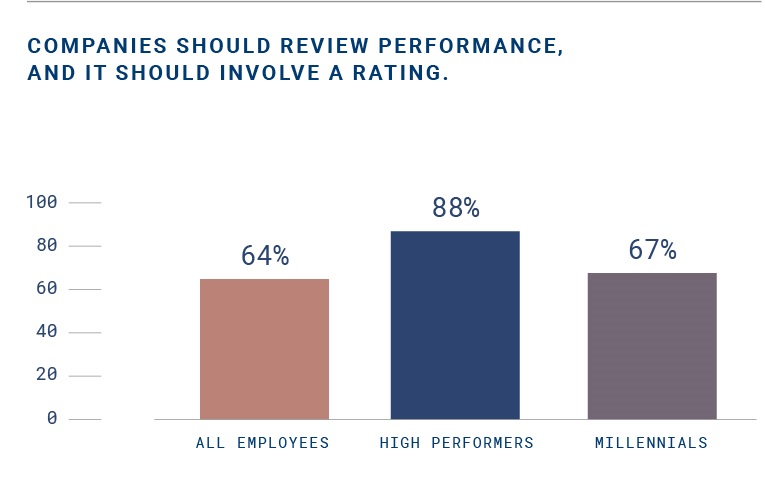
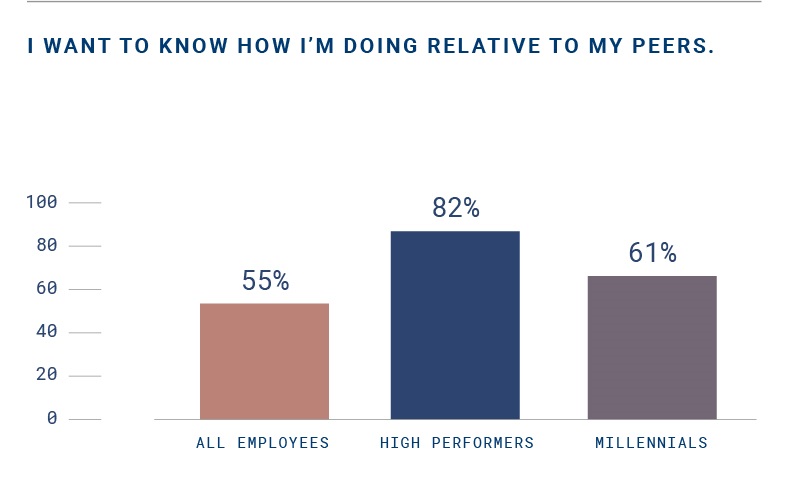
Underlying the push to get rid of ratings is a set of false choices. Consider the assumptions behind these choices and whether there’s actually a better option.
One of the earliest incorrect assumptions put forward was that ratings get in the way of effective manager-and-employee conversations. We question whether choosing to eliminate ratings will lead to more frequent conversations. If managers were relieved of hours spent on performance management, should we assume they would spend those hours coaching employees? And why assume that assessing employees and coaching them are mutually exclusive? In fact, coaching relies on assessment.
How does one provide feedback without assessing performance?
Another false choice is quantification vs. humanization. These are not mutually exclusive, either. We constantly make evaluative judgments about the performance, skills, and attributes of those we work with and who work for us. We make judgments about whether a fellow employee “doesn’t have it,” “has it,” or “knocks it out of the park” every day. Is that dehumanizing?
The most common false choice we encounter is that we either can get rid of ratings or be stuck with bad performance management. Pause and ask, “Are these my only choices? What about actually fixing performance management to ensure it drives our business and talent strategy?”
Challenging convention is always healthy, and the energy around changing performance management will likely lead us all in a good direction. But misleading headlines and false choices will only get in the way. Organizations approaching these decisions thoughtfully will achieve improved outcomes.
False choices
| Bad Performance Management | OR | No Performance Ratings |
| Quantification | OR | Humanization |
| Ratings | OR | Conversation |

What are you really trying to achieve? Drop the laundry list and prioritize based on your business direction and its talent implications — then be sure to consider the trade-offs inherent in design. You’ll have to make choices; different objectives should lead to practical differences in your process.

The way you manage performance needs to reflect your unique culture, working environment, and talent needs. What works for one organization won’t necessarily work for another.

There’s no faster way to disengage your employees than by adding HR “administrivia.” Ensure performance management is a business — driving process rather than an HR chore by resisting the urge to add complexity.

If you want to pay for performance, you need to differentiate. Call it “ratings,” “assessment,” “outlier identification” — whatever you want, as long as you know who your top, strong and low performers are. Be transparent and then follow through so your strategy, design and pay actions are in sync.

Prioritize the human element and the need for continuous managerial feedback and coaching with a regular cadence of interactions. A once-a-year review with your employees won’t cut it. Hold your managers accountable — it can be done.

The "best" design will fall flat if not well-executed. Ensure that:
We start every client engagement with the following principle in mind: It’s about you and your talent. What is unique about your company? How do you view your people? What are you trying to accomplish?
Kincentric will help you get there
Getting performance management right requires a holistic approach — today more than ever. Siloed thinking leads to suboptimal design and unintended consequences. Our consulting brings expertise in talent process design, employee experience, compensation, HR technology, and change management. We combine all of this together seamlessly, providing end-to-end design and implementation support.
Process design
We partner with our clients to design a performance management process that drives results through:
We ensure the right balance between leveraging data and leading practices, while customizing and innovating solutions to meet our clients’ unique needs.
Education
Our proprietary education helps managers set goals, assess achievement, and provide feedback more effectively. The interactive training will help your managers feel more comfortable with the overall performance management process, increase their confidence, and allow them to be more accountable for making and delivering.
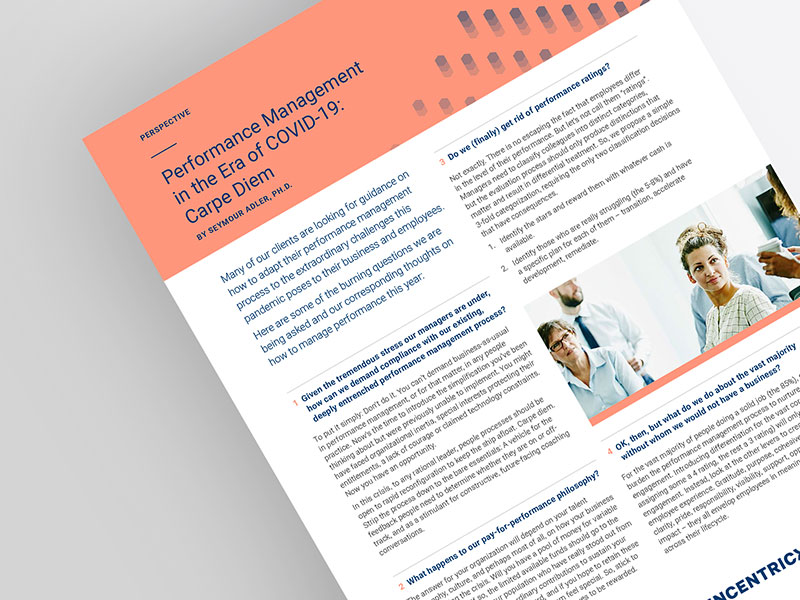
Many of our clients are looking for guidance on how to adapt their performance management process to the extraordinary challenges this pandemic poses to their business and employees.

What matters the most in leadership is the unique connection forged between a leader and each and every individual member of the team.

An engaging leader profile is built through the leader’s guiding beliefs, displayed behaviors, and critical experience.